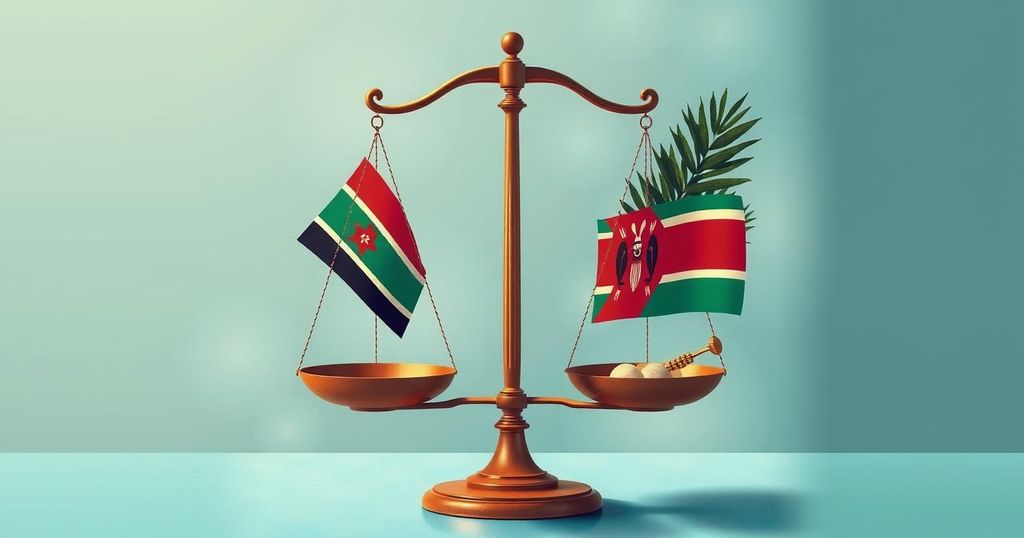Global news
AFRICA, CIVIL WAR, CONFLICT RESOLUTION, DRC, EGYPT, HEM, HEMEDTI, INTERNATIONAL CONFERENCE, KENYA, KIT, KITHURE KINDIKI, M23, MOHAMED HAMDAN “ HEMEDTI ” DAGALO, PEACEKEEPING, RAPID SUPPORT FORCES, REGIONAL COOPERATION, RSF, SOVEREIGNTY, U. N, U. N. SECURITY COUNCIL, U. S, U. S. STATE DEPARTMENT, UNITED NATIONS
Marcus Li
0 Comments
Kenya’s Controversial Diplomatic Stance: Accusations of Support for RSF
Kenya faces accusations from Sudan for allegedly siding with the Rapid Support Forces (RSF) following an encounter between Kenyan officials and RSF leaders. The ongoing conflict in Sudan has resulted in severe humanitarian crises. Despite claims of neutrality from the Kenyan government, international bodies express grave concerns about Kenya’s actions, which may threaten its standing as a mediator and raise human rights issues.
Kenya is facing severe accusations from Sudan for allegedly siding with the Rapid Support Forces (RSF) amid ongoing atrocities in the region. This diplomatic fallout was initiated by images of Kenyan Vice President Kithure Kindiki welcoming RSF leader Mohamed Hamdan ‘Hemedti’ Dagalo at Nairobi’s Jomo Kenyatta International Airport. Sudan condemned this action, claiming it reflects an ‘irresponsible stance’ and places Kenya in the category of a ‘rogue state’ that disregards international norms.
The RSF and Sudanese army have been engaged in a brutal civil war since April 2023, leading to thousands of deaths and displacing over 12.5 million individuals. Both the RSF and Sudan’s military have faced sanctions from the United States and the United Nations for their involvement in these atrocious acts. Despite this, Kenya hosted RSF leaders in 2024, where they signed a charter forming a parallel government in Sudan, drawing international criticism.
In response to the claims of partisanship, Kenya has insisted on maintaining a neutral position, stating, ‘With its credentials as an enabler of peace in the region and across the globe, Kenya remains at the forefront of seeking solutions to the humanitarian crisis in Sudan.’ However, such actions have led to significant backlash, with the U.S. and U.N. expressing deep concern over this involvement, warning that it undermines prospects for peace and stability in Sudan.
Kenya’s alleged conflicts are not limited to Sudan. The nation also hosted members of the M23 rebel group in late 2023 despite their controversial history in the Democratic Republic of Congo (DRC). This led to a strong reaction from the DRC, including the recall of its ambassador and the expulsion of Kenyan troops, further complicating regional relations.
Human rights violations linked to Kenya are also alarming. Numerous organizations have criticized the government for apprehending opposition leaders and deporting asylum-seekers to countries where they face severe persecution risks. Noteworthy incidents include the November 2023 abduction of Ugandan opposition leader Kizza Besigye in Nairobi, alongside the repatriation of four asylum-seekers to Turkey, risking their safety.
In conclusion, what once was Kenya’s esteemed role as a mediator in African conflicts is now clouded by accusations of bias and support for factions like the RSF and M23 rebels. The country’s increasingly controversial actions, including its poor human rights record, signal a departure from traditional diplomatic protocols and contribute to its perceived isolation from both international and regional norms. Analysts are growing concerned that this trajectory may classify Kenya as a rogue state in the eyes of the international community.
In summary, Kenya’s recent diplomatic engagements, particularly with the RSF and M23 rebels, have led to significant accusations undermining its previous neutrality. Coupled with a troubling human rights record, Kenya’s actions suggest a shift towards partisanship in regional conflicts. Consequently, the nation faces growing isolation on the international stage, as it strays from established diplomatic norms and practices.
Original Source: www.voanews.com




Post Comment